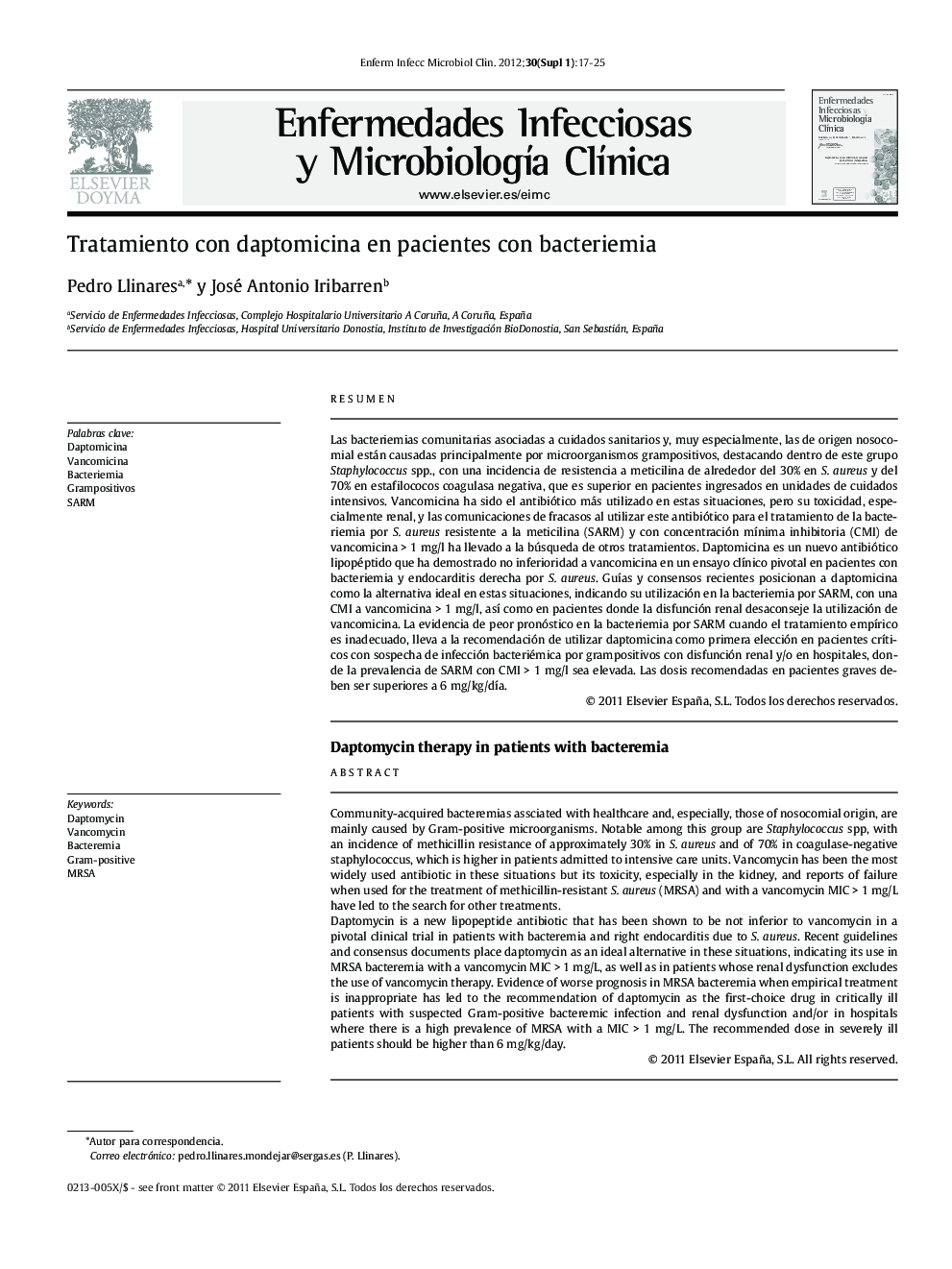| کد مقاله | کد نشریه | سال انتشار | مقاله انگلیسی | نسخه تمام متن |
|---|---|---|---|---|
| 3401559 | 1222672 | 2012 | 9 صفحه PDF | دانلود رایگان |

ResumenLas bacteriemias comunitarias asociadas a cuidados sanitarios y, muy especialmente, las de origen nosocomial están causadas principalmente por microorganismos grampositivos, destacando dentro de este grupo Staphylococcus spp., con una incidencia de resistencia a meticilina de alrededor del 30% en S. aureus y del 70% en estafilococos coagulasa negativa, que es superior en pacientes ingresados en unidades de cuidados intensivos. Vancomicina ha sido el antibiótico más utilizado en estas situaciones, pero su toxicidad, especialmente renal, y las comunicaciones de fracasos al utilizar este antibiótico para el tratamiento de la bacteriemia por S. aureus resistente a la meticilina (SARM) y con concentración mínima inhibitoria (CMI) de vancomicina > 1 mg/l ha llevado a la búsqueda de otros tratamientos. Daptomicina es un nuevo antibiótico lipopéptido que ha demostrado no inferioridad a vancomicina en un ensayo clínico pivotal en pacientes con bacteriemia y endocarditis derecha por S. aureus. Guías y consensos recientes posicionan a daptomicina como la alternativa ideal en estas situaciones, indicando su utilización en la bacteriemia por SARM, con una CMI a vancomicina > 1 mg/l, así como en pacientes donde la disfunción renal desaconseje la utilización de vancomicina. La evidencia de peor pronóstico en la bacteriemia por SARM cuando el tratamiento empírico es inadecuado, lleva a la recomendación de utilizar daptomicina como primera elección en pacientes críticos con sospecha de infección bacteriémica por grampositivos con disfunción renal y/o en hospitales, donde la prevalencia de SARM con CMI > 1 mg/l sea elevada. Las dosis recomendadas en pacientes graves deben ser superiores a 6 mg/kg/día.
Community-acquired bacteremias assciated with healthcare and, especially, those of nosocomial origin, are mainly caused by Gram-positive microorganisms. Notable among this group are Staphylococcus spp, with an incidence of methicillin resistance of approximately 30% in S. aureus and of 70% in coagulase-negative staphylococcus, which is higher in patients admitted to intensive care units. Vancomycin has been the most widely used antibiotic in these situations but its toxicity, especially in the kidney, and reports of failure when used for the treatment of methicillin-resistant S. aureus (MRSA) and with a vancomycin MIC > 1 mg/L have led to the search for other treatments.Daptomycin is a new lipopeptide antibiotic that has been shown to be not inferior to vancomycin in a pivotal clinical trial in patients with bacteremia and right endocarditis due to S. aureus. Recent guidelines and consensus documents place daptomycin as an ideal alternative in these situations, indicating its use in MRSA bacteremia with a vancomycin MIC > 1 mg/L, as well as in patients whose renal dysfunction excludes the use of vancomycin therapy. Evidence of worse prognosis in MRSA bacteremia when empirical treatment is inappropriate has led to the recommendation of daptomycin as the first-choice drug in critically ill patients with suspected Gram-positive bacteremic infection and renal dysfunction and/or in hospitals where there is a high prevalence of MRSA with a MIC > 1 mg/L. The recommended dose in severely ill patients should be higher than 6 mg/kg/day.
Journal: Enfermedades Infecciosas y Microbiología Clínica - Volume 30, Supplement 1, February 2012, Pages 17-25